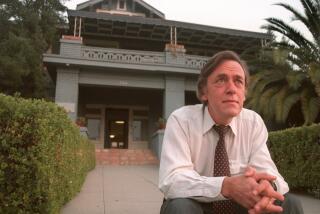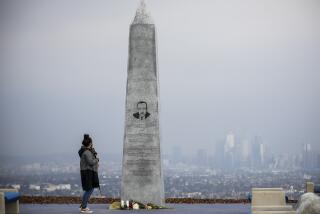Luke Cole dies at 46; leading practitioner of environmental law
Luke Cole, a leading theorist and practitioner of environmental justice law, who battled toxic waste facilities, mega-dairies, mining companies and other pollution threats in poor and minority communities in California and Alaska, died Saturday in a car crash in Uganda. He was 46.
Cole was traveling with his wife on a rural road in western Uganda when a truck hit their vehicle head-on. He died at a clinic a short time later, according to his father, Herbert Cole. His wife, Nancy Shelby, was flown to a hospital in Amsterdam, where she is recovering from her injuries.
A man of many passions, Cole was the executive director of the Center on Race, Poverty and the Environment, a San Francisco-based nonprofit he founded in 1989 to address environmental racism, in which low-income and minority communities are alleged to suffer a disproportionate share of pollution problems.
Cole first demonstrated his innovative approach in 1990, when he helped the poor, Latino residents of Kettleman City in the San Joaquin Valley defeat a proposed toxic waste incinerator project by pointing out that the environmental impact report had not been translated into Spanish, the primary language of almost half of the town’s residents.
In the late 1990s he applied civil rights law to a case in South Camden, N.J., where an impoverished black community opposed the construction of a cement recycling plant. The proposed plant met technical requirements, but Cole, citing Title VI of the Civil Rights Act of 1964, argued that it would worsen the quality of life in a minority community that was already suffering from high levels of exposure to dangerous pollutants.
In Kivalina, Alaska, he recently settled a case against a major zinc producer whose mining operations he said were fouling the water supply of a 4,000-year-old Inupiat Eskimo village. He was continuing to represent the Inupiat people in a new lawsuit alleging that Exxon, Chevron and other oil companies were contributing to global warming, which some experts say is causing Kivalina to erode.
“It was brilliant what he accomplished in his short life,” said Sheila Foster, a Fordham University law professor who co-wrote a book with Cole and called him the nation’s leading environmental justice lawyer.
Born in North Adams, Mass., on July 15, 1962, Cole mainly grew up in New York and Santa Barbara but spent part of his childhood in Nigeria, where his father, a UC Santa Barbara African art historian, went on research trips.
In 1989, the graduate of Stanford University and Harvard Law School tried to find a job that would allow him to combine his interests in social justice and the environment with legal action, but such a job didn’t seem to exist. When he approached environmental law and poverty law groups, they said, “ ‘We don’t do the kind of work you’re describing,’ ” said Brent Newell, legal director of the Center for Race, Poverty and the Environment.
So Cole moved to California, where he met Ralph Abascal, the longtime general counsel for the nonprofit California Rural Legal Assistance. Abascal, who had litigated cases involving farmworkers and pesticide contamination, understood what Cole wanted to do. He gave the young lawyer a desk and a phone and helped him raise money to open a law center that embraced his goals. The center now has a staff of 20 and offices in Delano, Fresno and Madera, as well as San Francisco.
From 1996 to 2000 Cole served on the U.S. Environmental Protection Agency’s National Environmental Justice Advisory Council. He also taught environmental justice seminars at Stanford Law School, Boalt Hall and Hastings College of the Law.
He was often portrayed by opponents as a “fear-mongering” outsider who misrepresented the issues and manipulated his small-town clients. Cole made no secret of the fact that one of his goals was to train people to fight their own battles against large, well-funded corporate interests.
“He empowered us,” said Linda MacKay, who met Cole in 1989 when she learned that a hazardous waste facility was going to be built near her home in Alpaugh, an agricultural town in Tulare County. The mother of two became an activist who helped mobilize her fellow residents to defeat the project.
“He taught us that we had every right to be involved and how to be involved,” she said. “I’m going to miss him.”
An avid birder, connoisseur of root beer and collector of bobbleheads and miniature spy cameras, Cole had taken off in early March on what was to be a four-month sabbatical. He traveled to South America, Antarctica, Madagascar and South Africa. Uganda, where his brother lives, was one of his last stops.
In addition to his father and his wife, with whom he would have celebrated a 10th wedding anniversary this month, he is survived by his mother, Alexandra Cole, and stepmother, Shelley Cole, both of Santa Barbara; two brothers, Peter of Brooklyn, N.Y., and Thomas of Kampala, Uganda; a sister, Sarah Cole, of Santa Barbara; a stepbrother, Daryn Kenny of Pleasant Hill, Calif.; and a son, Zane Shelby, of Boston.
Memorial donations can be sent to the Center on Race, Poverty and the Environment, 47 Kearny St., Suite 804, San Francisco, CA 94108.
More to Read
Start your day right
Sign up for Essential California for the L.A. Times biggest news, features and recommendations in your inbox six days a week.
You may occasionally receive promotional content from the Los Angeles Times.







